How to stop pclifedesktop.com from sending ads
Notification SpamAlso Known As: Ads by pclifedesktop.com
Get free scan and check if your device is infected.
Remove it nowTo use full-featured product, you have to purchase a license for Combo Cleaner. Seven days free trial available. Combo Cleaner is owned and operated by RCS LT, the parent company of PCRisk.com.
What kind of page is pclifedesktop[.]com?
After conducting an investigation, we determined that pclifedesktop[.]com is a fraudulent website running the "Your PC is infected with 5 viruses!" scam. Moreover, pclifedesktop[.]com wants to receive permission to show notifications. Our discovery of pclifedesktop[.]com occurred during our examination of pages associated with rogue advertising networks.
![pclifedesktop[.]com ads](/images/stories/screenshots202306/pclifedesktop-com-ads-main.jpg)
Pclifedesktop[.]com in detail
Upon visiting pclifedesktop[.]com, the website initiates a false system scan and subsequently presents a message indicating that the computer is infected with five viruses. The fabricated virus warning asserts that these "detected" viruses jeopardize the system and sensitive information, including personal data and banking details.
The user is urged to commence a scan using McAfee Antivirus to eliminate the alleged threats. It is crucial to emphasize that pclifedesktop[.]com is unrelated to the McAfee company or its products. The deceptive website falsely associates itself with McAfee, creating a misleading impression.
Upon clicking the "Start McAfee" button, pclifedesktop[.]com redirects the user to a URL that includes an affiliate's ID. This indicates that pclifedesktop[.]com is created by affiliates who earn commissions by selling McAfee antivirus subscriptions through their affiliate links. This redirection intends to generate financial benefits for the affiliates.
In addition to using scare tactics to promote reputable antivirus software, pclifedesktop[.]com requests permission to display notifications. However, these notifications may promote deceptive schemes, potentially malicious websites, untrustworthy applications, etc.
We found that pclifedesktop[.]com displays notifications claiming that a computer is infected with several viruses and urging to perform a virus scan to avoid damage.
| Name | Ads by pclifedesktop.com |
| Threat Type | Push notifications ads, Unwanted ads, Pop-up ads |
| Detection Names | N/A (VirusTotal) |
| Serving IP Address | 104.21.33.31 |
| Symptoms | Seeing advertisements not originating from the sites you are browsing. Intrusive pop-up ads. Decreased Internet browsing speed. |
| Distribution Methods | Deceptive pop-up ads, false claims within visited websites, unwanted applications (adware) |
| Damage | Decreased computer performance, browser tracking - privacy issues, possible additional malware infections. |
| Malware Removal (Windows) |
To eliminate possible malware infections, scan your computer with legitimate antivirus software. Our security researchers recommend using Combo Cleaner. Download Combo CleanerTo use full-featured product, you have to purchase a license for Combo Cleaner. 7 days free trial available. Combo Cleaner is owned and operated by RCS LT, the parent company of PCRisk.com. |
More about such pages
Users typically encounter sites like pclifedesktop[.]com through dubious advertisements and websites that employ rogue advertising networks. Torrent sites, illegal movie streaming pages, and similar platforms often utilize such networks. It is rare for users to intentionally visit sites like pclifedesktop[.]com.
More example of websites that use scare tactics to promote legitimate software are reliablepcmatter[.]com, mypcdefenderplus[.]site, and protectusonline[.]xyz.
How did pclifedesktop[.]com gain permission to deliver spam notifications?
Pclifedesktop[.]com displays notifications because it has obtained permission to do so. This permission is granted when the visitor clicks the "Allow" button while visiting pclifedesktop[.]com. Websites cannot show notifications unless the visitor explicitly agrees to receive them.
How to prevent deceptive sites from delivering spam notifications?
To prevent unwanted notifications, users should close suspicious websites or select the "Block", "Block Notifications", or a similar option when prompted for permission. It is important to be cautious of sites that claim certain actions require clicking the "Allow" button, such as playing a video, downloading a file, or confirming one's identity as a human, as these claims are misleading.
If you are receiving unwanted notifications, we recommend running a scan with Combo Cleaner Antivirus for Windows to automatically eliminate them.
Appearance of pclifedesktop[.]com website (GIF):
![pclifedesktop[.]com website appearance (GIF)](/images/stories/screenshots202306/pclifedesktop-com-ads-appearance.gif)
Notification from pclifedesktop[.]com:
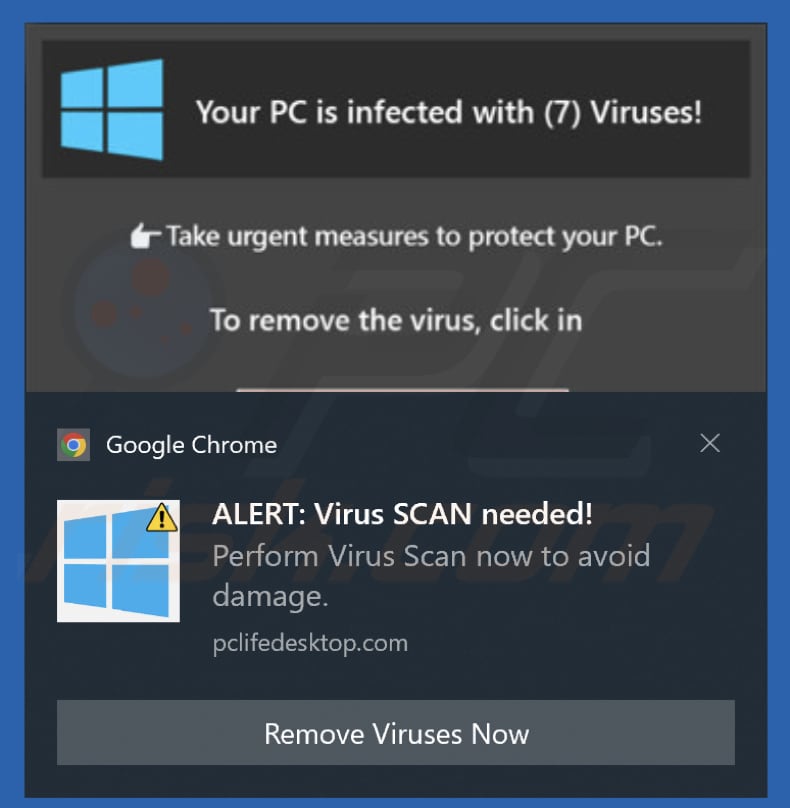
Instant automatic malware removal:
Manual threat removal might be a lengthy and complicated process that requires advanced IT skills. Combo Cleaner is a professional automatic malware removal tool that is recommended to get rid of malware. Download it by clicking the button below:
DOWNLOAD Combo CleanerBy downloading any software listed on this website you agree to our Privacy Policy and Terms of Use. To use full-featured product, you have to purchase a license for Combo Cleaner. 7 days free trial available. Combo Cleaner is owned and operated by RCS LT, the parent company of PCRisk.com.
Quick menu:
- What is Ads by pclifedesktop.com?
- STEP 1. Remove spam notifications from Google Chrome
- STEP 2. Remove spam notifications from Google Chrome (Android)
- STEP 3. Remove spam notifications from Mozilla Firefox
- STEP 4. Remove spam notifications from Microsoft Edge
- STEP 5. Remove spam notifications from Safari (macOS)
Disable unwanted browser notifications:
Video showing how to disable web browser notifications:
 Remove spam notifications from Google Chrome:
Remove spam notifications from Google Chrome:
Click the Menu button (three dots) on the right upper corner of the screen and select "Settings". In the opened window select "Privacy and security", then click on "Site Settings" and choose "Notifications".
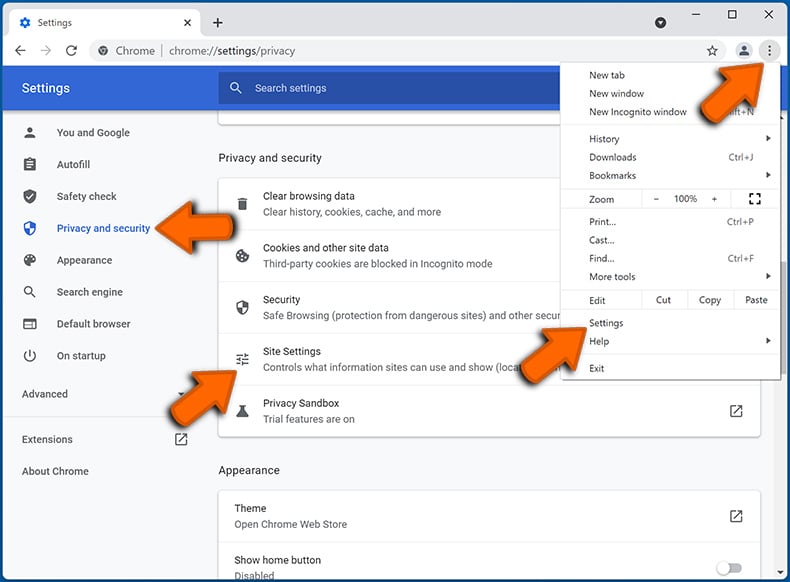
In the "Allowed to send notifications" list search for websites that you want to stop receiving notifications from. Click on the three dots icon near the website URL and click "Block" or "Remove" (if you click "Remove" and visit the malicious site once more, it will ask to enable notifications again).
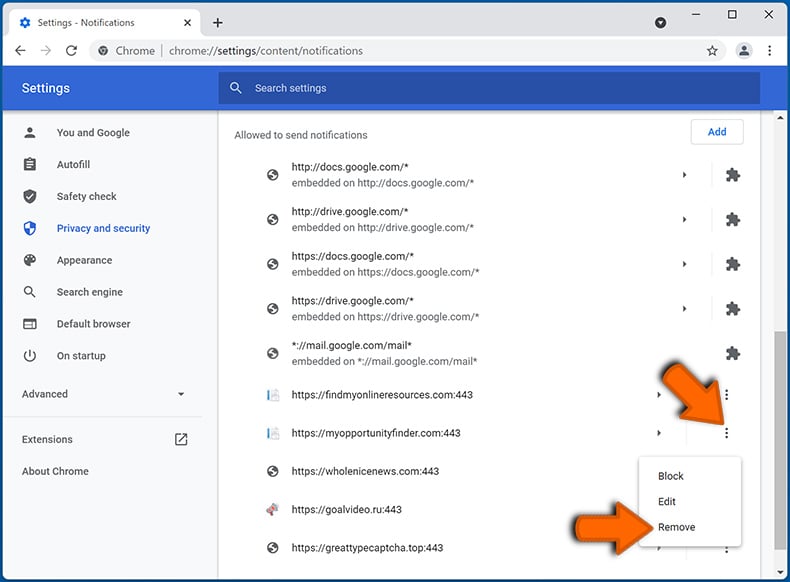
 Remove spam notifications from Google Chrome (Android):
Remove spam notifications from Google Chrome (Android):
Tap the Menu button (three dots) on the right upper corner of the screen and select "Settings". Scroll down, tap on "Site settings" and then "Notifications".
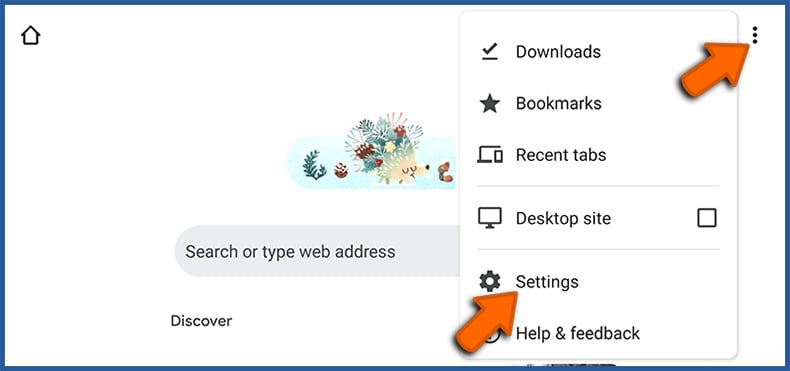
In the opened window, locate all suspicious URLs and tap on them one-by-one. Once the pop-up shows up, select either "Block" or "Remove" (if you tap "Remove" and visit the malicious site once more, it will ask to enable notifications again).
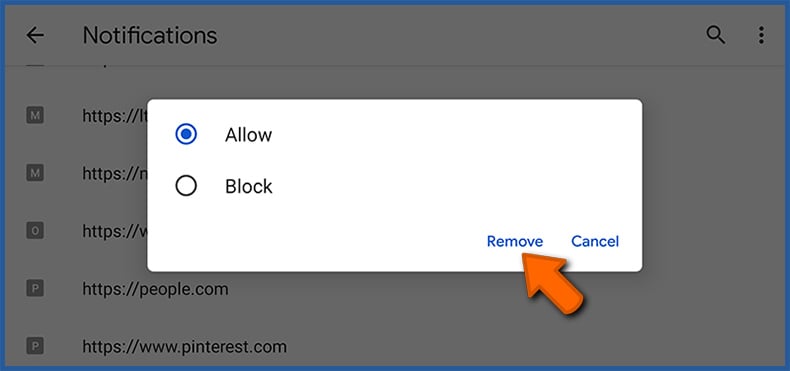
 Remove spam notifications from Mozilla Firefox:
Remove spam notifications from Mozilla Firefox:
Click the Menu button (three bars) on the right upper corner of the screen. Select "Settings" and click on "Privacy & Security" in the toolbar on the left hand side of the screen. Scroll down to the "Permissions" section and click the "Settings" button next to "Notifications".
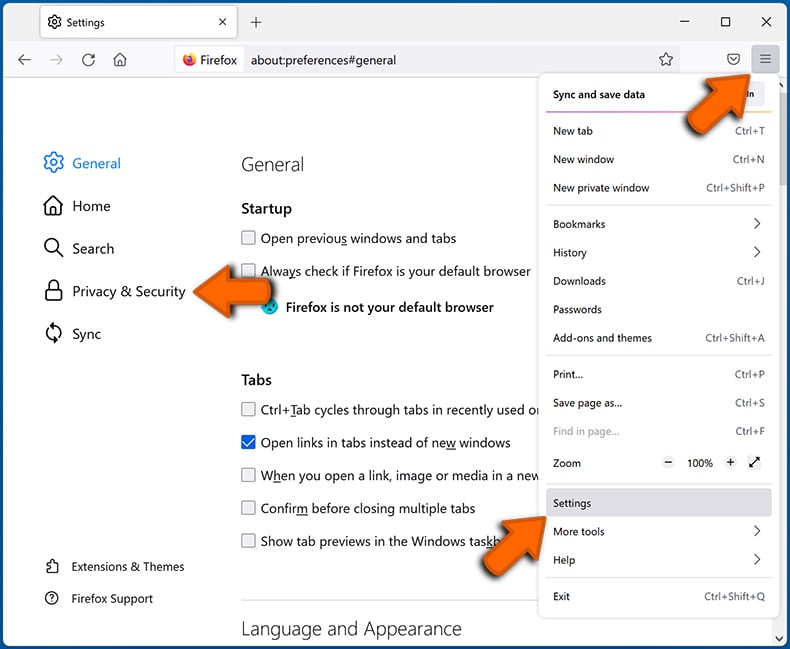
In the opened window, locate all suspicious URLs and block them using the drop-down menu or either remove them by clicking "Remove Website" at the bottom of the window (if you click "Remove Website" and visit the malicious site once more, it will ask to enable notifications again).
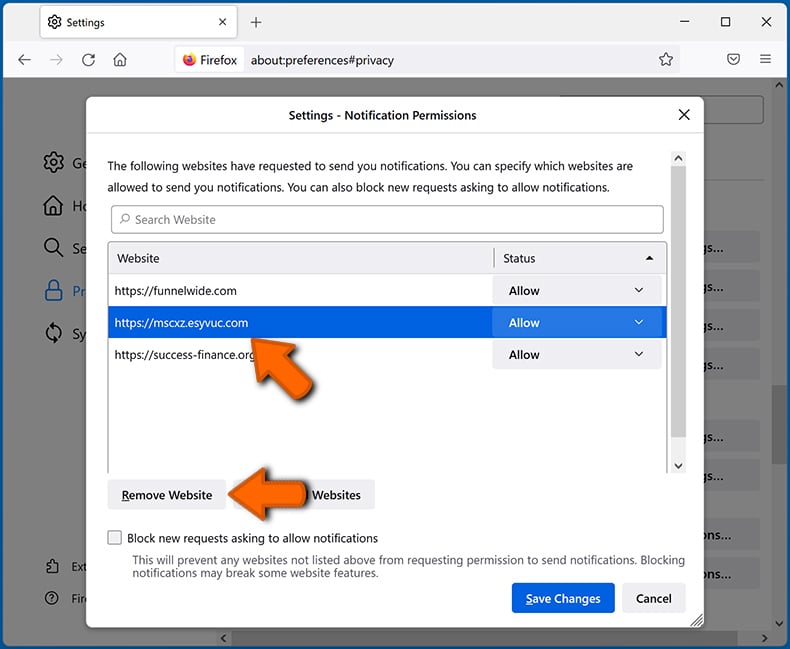
 Remove spam notifications from Microsoft Edge:
Remove spam notifications from Microsoft Edge:
Click the menu button (three dots) on the right upper corner of the Edge window and select "Settings". Click on "Cookies and site permissions" in the toolbar on the left hand side of the screen and select "Notifications".
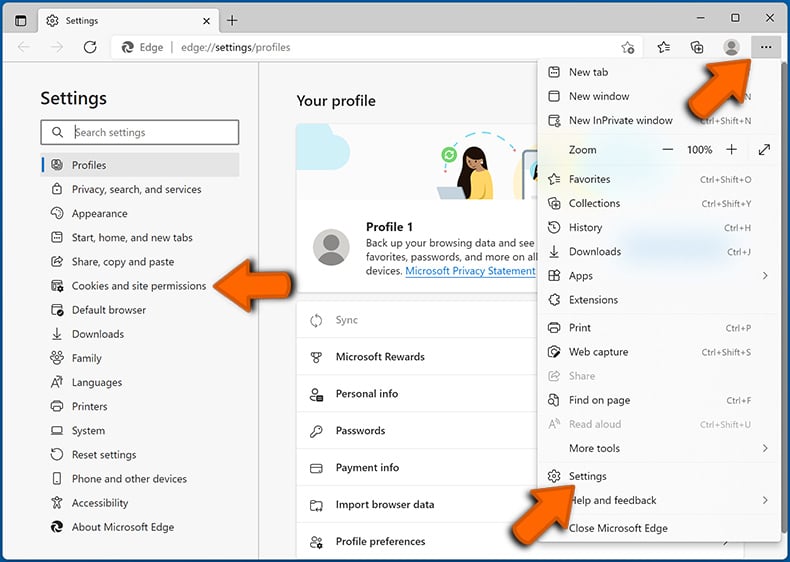
Click three dots on the right hand side of each suspicious URL under "Allow" section and click "Block" or "Remove" (if you click "Remove" and visit the malicious site once more, it will ask to enable notifications again).
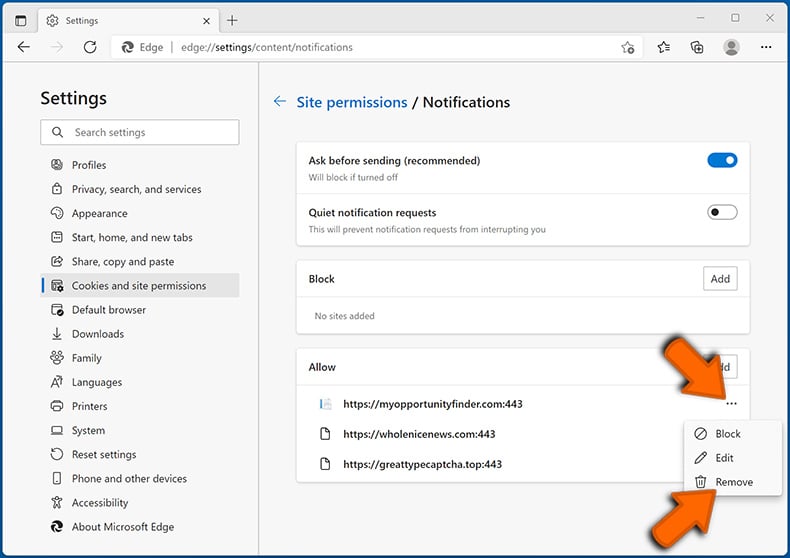
 Remove spam notifications from Safari (macOS):
Remove spam notifications from Safari (macOS):
Click "Safari" button on the left upper corner of the screen and select "Preferences...". Select the "Websites" tab and then select "Notifications" section on the left pane.
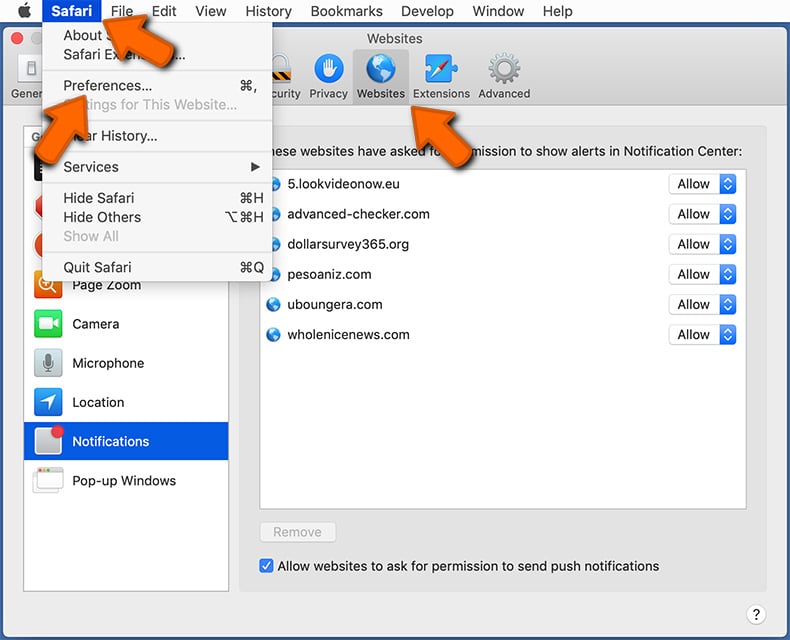
Check for suspicious URLs and apply the "Deny" option using the drop-down menu or either remove them by clicking "Remove" at the bottom of the window (if you click "Remove" and visit the malicious site once more, it will ask to enable notifications again)
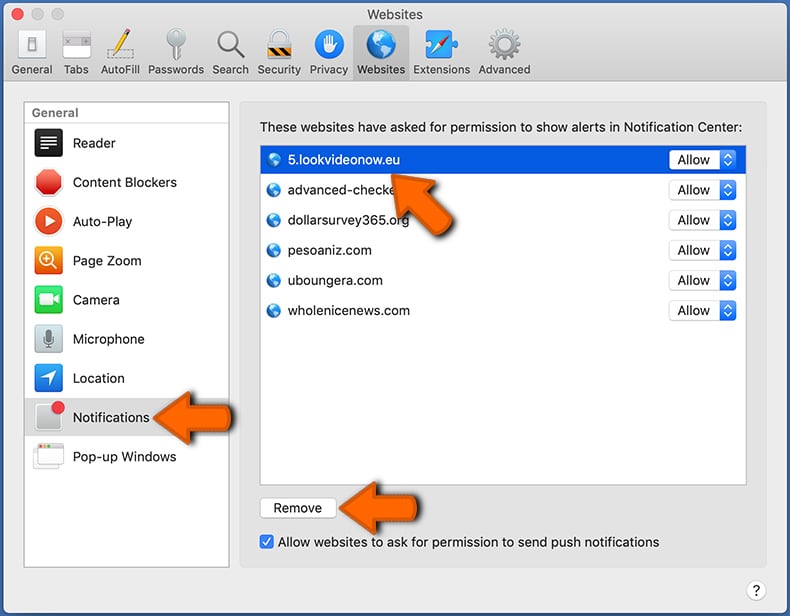
How to avoid browser notification spam?
Internet users should be very skeptical when being asked to allow notifications. While this is a useful feature that allows you to receive timely news from websites you like, deceptive marketers frequently abuse it.
Only allow notifications from websites that you fully trust. For added security - use an anti-malware application with a real-time web browsing monitor to block shady websites that tries to trick you into allowing spam notifications. We recommend using Combo Cleaner Antivirus for Windows.
Frequently Asked Questions (FAQ)
Why am I seeing ads (browser notifications) delivered by pclifedesktop[.]com in the right lower corner of my desktop?
Pclifedesktop[.]co has obtained permission to display notifications, as no website can show notifications without the consent of the visitor. This consent is granted by clicking the "Allow" button when browsers inform visitors about the website's request to show notifications.
I have clicked on notification ads, is my computer infected?
No, notifications themselves cannot infect computers. However, notifications shown by untrustworthy websites have the potential to lead users to malicious pages.
Is pclifedesktop[.]com a virus?
Websites such as pclifedesktop[.]co are not classified as viruses. However, they use deceptive messages and content to entice visitors to buy legitimate antivirus software. Additionally, these websites may display notifications that promote scams, potentially harmful applications, and dubious websites.
Will Combo Cleaner remove pclifedesktop[.]com ads automatically or manual steps are still required?
Combo Cleaner can scan your computer, revoke any permissions granted to pclifedesktop[.]com, and eliminate any associated threats. Once the scan is complete, Combo Cleaner will block any further access to pclifedesktop[.]com, ensuring that no additional steps are necessary.
Share:

Tomas Meskauskas
Expert security researcher, professional malware analyst
I am passionate about computer security and technology. I have an experience of over 10 years working in various companies related to computer technical issue solving and Internet security. I have been working as an author and editor for pcrisk.com since 2010. Follow me on Twitter and LinkedIn to stay informed about the latest online security threats.
PCrisk security portal is brought by a company RCS LT.
Joined forces of security researchers help educate computer users about the latest online security threats. More information about the company RCS LT.
Our malware removal guides are free. However, if you want to support us you can send us a donation.
DonatePCrisk security portal is brought by a company RCS LT.
Joined forces of security researchers help educate computer users about the latest online security threats. More information about the company RCS LT.
Our malware removal guides are free. However, if you want to support us you can send us a donation.
Donate
▼ Show Discussion